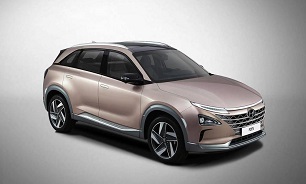Audi And Hyundai Team Up To Work On Fuel Cell Tech
The agreement is currently subject to approval from the applicable regulatory authorities.

Khodrocar - Following the surprising announcement that Volkswagen and Ford have signed a Memorandum of Understanding, laying the foundations of a future strategic alliance with a focus on commercial vehicles, Audi and Hyundai are now informing us the two companies are also teaming up, but they will develop fuel cell technologies.
The official press release states that the German and South Korean automakers have plans to cross-license patents and grant access to non-competitive components. The main goal of the project will be to bring fuel cell to volume production more effectively. It’s important to note that the agreement is still subject to approval from the applicable regulatory authorities.
"The fuel cell is the most systematic form of electric driving and thus a potent asset in our technology portfolio for the emission-free premium mobility of the future,” Peter Mertens, board member for technical development at Audi, comments. "On our FCEV roadmap, we are joining forces with strong partners such as Hyundai. For the breakthrough of this sustainable technology, cooperation is the smart way to leading innovations with attractive cost structures.”
The official press release states that the German and South Korean automakers have plans to cross-license patents and grant access to non-competitive components. The main goal of the project will be to bring fuel cell to volume production more effectively. It’s important to note that the agreement is still subject to approval from the applicable regulatory authorities.
"The fuel cell is the most systematic form of electric driving and thus a potent asset in our technology portfolio for the emission-free premium mobility of the future,” Peter Mertens, board member for technical development at Audi, comments. "On our FCEV roadmap, we are joining forces with strong partners such as Hyundai. For the breakthrough of this sustainable technology, cooperation is the smart way to leading innovations with attractive cost structures.”
Mertens’ words were echoed by Hyundai’s vice chairman, Euisun Chung: "We are confident that our partnership with Audi will successfully demonstrate the vision and benefits of FCEVs to the global society.”
It’s too early to say what this new cooperation will bring to the market, but Audi and Hyundai say they will be also exploring into far-reaching collaboration on the development of "this sustainable technology.” Audi also explains the cross-license agreement will be focused on the next generation fuel cell vehicles from the German automaker, which currently has plans to launch a small production series of SUV FCEVs early next decade.
Hyundai has been offering fuel cell electric vehicles since 2013 and is currently selling them in 18 countries around the globe. On the other hand, Audi has been working on the technology for almost two decades.
It’s too early to say what this new cooperation will bring to the market, but Audi and Hyundai say they will be also exploring into far-reaching collaboration on the development of "this sustainable technology.” Audi also explains the cross-license agreement will be focused on the next generation fuel cell vehicles from the German automaker, which currently has plans to launch a small production series of SUV FCEVs early next decade.
Hyundai has been offering fuel cell electric vehicles since 2013 and is currently selling them in 18 countries around the globe. On the other hand, Audi has been working on the technology for almost two decades.
Source: motor1.com
Latest News


